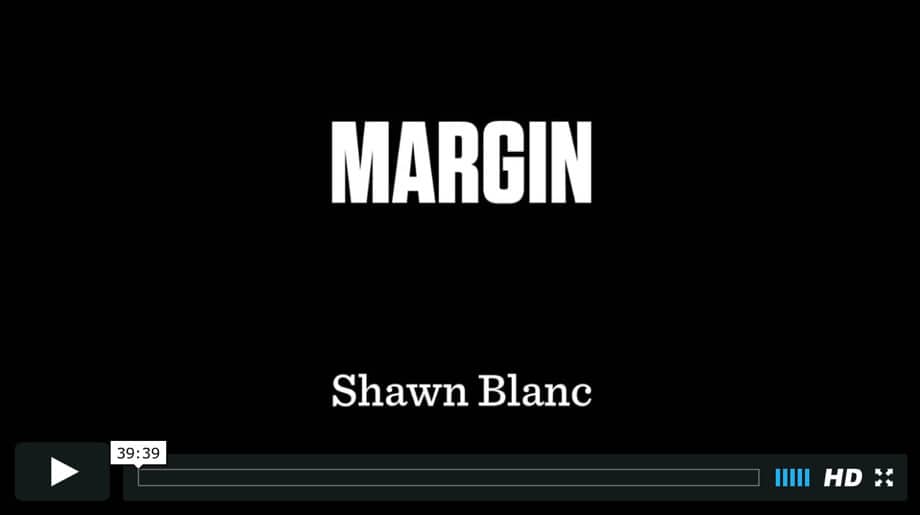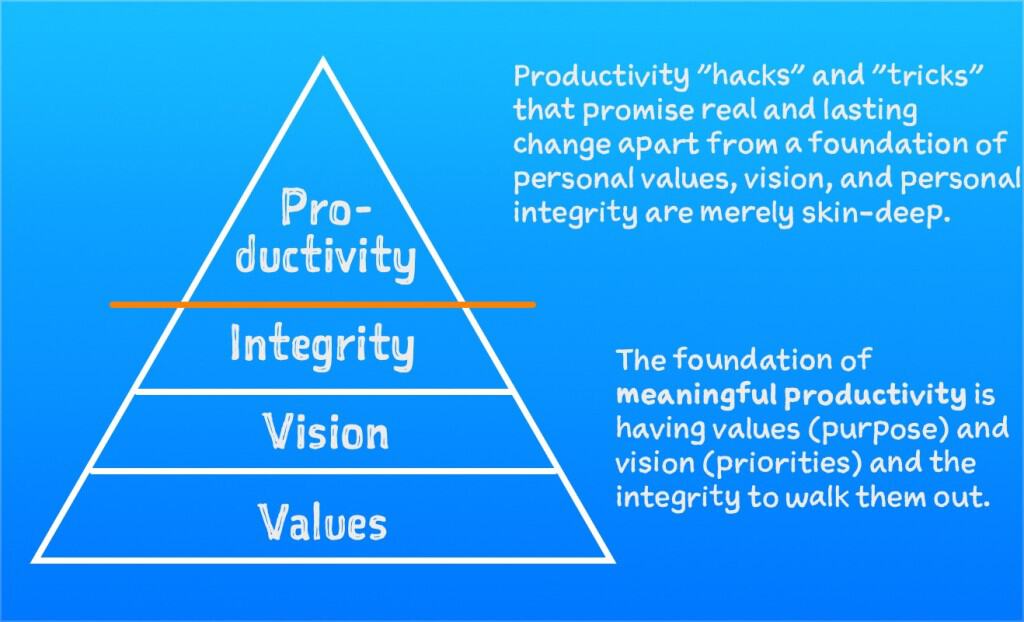In his book, Deep Work, Cal Newport states that as our information economy grows, there is an ever-increasing advantage for knowledge workers who are able to focus.
His Deep Work Hypothesis is this:
The ability to perform deep work is becoming increasingly rare at exactly the same time it is becoming increasingly valuable in our economy. As a consequence, the few who cultivate this skill, and then amen it the core of their working life, will thrive.
In this article, as we hit on the importance of margin for our mental and creative energy, I want to frame it in the context of deep work.
Making the Time and Choosing the Focus
If you want to do your best creative work, you’ve got to show up every day. But showing up is just half of it.
Once you’ve carved out the time you need to work, when you do sit down to focus, do you know what it is that you’re going to work on? And are you able to spend an hour or more of your time working without interruption?
For me, I have a minimum of two hours a day that I spend on what Newport would call deep work. In fact, it’s the very first thing I do in the morning: I write.
I set a note out for myself the day before that tells me what my writing topic will be. This way, when it comes time for me to do the work, all I need to do is open my text editor and begin writing. I don’t have to spend my time thinking about what to write about, I simply write.
Writing is not easy. It’s never been easy, and I suspect it never will be. I’ve been writing as my full-time vocation for half-a-decade now, and sitting down to write is as challenging, and cognitively demanding as ever.
Now, don’t take this as me complaining about my job. I love writing. I love the sound of my clicky keyboard. I love having a hot cup of coffee and a couple of hours to share a story or an idea. But no matter what, writing is hard work.
Challenging, demanding work is not mutually exclusive from work that is satisfying. In fact, the two usually go hand in hand.
And thus, I have a two very important reasons to show up every day and write:
- For one, as I mentioned above, it’s something I can do each day that keeps me mentally sharp. It’s challenging, difficult, and rewarding.
-
Secondly, writing is my job. Literally everything about my business stems from writing. If I’m not writing, then the very underpinnings of my work and business will slowly unravel.
The Paramount Importance of Margin for Thought (or: Why Facebook Hates Your Muse)
As I mentioned above, one very important step in my writing routine is The Note.
The other is having margin for my mental and creative energy.
Margin is, simply put, breathing room.
Does your mind have breathing room? Do you have have a strong distaste for distractions? Are you comfortable with boredom?
Now, of course you dislike distractions. I know that you know that I know that when you’re trying to do something, the last thing you want is to be interrupted. But, when the rubber meets the road, do you honestly, truly, really, really dislike distractions?
It’s one thing to be annoyed at the external distractions of unwanted phone calls and passive aggressive taps on the shoulder by bored coworkers.
It’s another thing altogether to let yourself CMD+Tab over to your email app every 10 minutes.
That tug you feel when you’re at the far edge of your attention span…? That distraction from within that shows up when you sit down to do work that matters…? What are you doing about that?
I totally know how it goes. You’re sitting down to work on a project, but after 10 or 20 minutes you hit a roadblock. What then? Do you instinctively reach for your phone to check Facebook? Do you switch over to the Twitter app or check your email inbox real quick? Or do you stay focused?
When you are trying to focus on deep work, don’t give up after 15 minutes. Stick with it for an hour.
When Matt Gemmell is writing and he hits a mental block, he reaches for a ball to toss while thinking. Marco Arment wrote a computer script that quits out of Tweetbot and Email in case he accidentally leaves them open. John Gruber tends to spend his time reading through all his RSS feeds in one pass, then focuses on writing; he also has an Apple Script that takes all the read-but-not-yet-replied-to emails in his inbox and archives them at the end of the day.
These are brilliant behaviors and tactics. Because they state that, in order to do our best creative work, we need depth and focus. Depth is a result of uninterrupted focus on a single task. And uninterrupted focus is a result of, well, not being interrupted — not being distracted.
To do your best creative work, you have to do more than hedge off the distractions from outside (buzzing phones and office interruptions). You also have to cut off the distractions from within.
You do that by creating margin for your thoughts and margin for your creative energy.
Quit “The Just Checks”
When was the last time you had a few minutes of free time and you chose not to spend it checking email, Facebook, Twitter, or Instagram? This morning, when you woke up, did you reach for your phone and spend some time perusing the news and your social network timelines before getting out of bed?
Here is, by far and away, one of the best ways you can keep margin for your thoughts and margin for your creative energy:
- Don’t check email when in line at the grocery store.
- Don’t check Facebook when in the drive-through.
- Don’t check the news before you get out of bed in the morning.
- Don’t check Twitter as the last thing you do before turing out the light and going to sleep.
Now, we all know that there’s nothing morally or instinctively wrong with checking your social media timeline before getting out of bed. And neither is there anything wrong with keeping your computer’s email app open all day and switching over to it every few minutes.
But what these moments of “just checking” do is teach our brains that boredom is bad. They put a ceiling on our creative energy.
You won’t reach the height of what you’re creatively capable of if you can’t go 60 minutes without checking your email or scrolling your Facebook timeline.
Choosing to allow yourself to be bored when standing in line at the grocery store is also a choice to set yourself up to do your absolute best creative work.
Finding Flow and Getting In the Zone
Having a set time for deep work is liberating. The days when I know I’ll have have several hours of uninterrupted time are the days I most look forward to.
Not only do I look forward to the task and process themselves, but I also love the work that is produced after a season of deep work and measured progress.
Again, to quote Cal Newport:
To succeed you have to produce the absolute best stuff you’re capable of producing — a task that requires depth.
Your best creative work happens when you’re in the zone. When, in the words of Mihaly Csikszentmihalyi, you’ve found flow.
Getting in the zone, finding flow, making progress on your best creative work, growing in skills as a creative, all of this requires intentional practice. It requires depth.
The good news is two-fold:
- Making margin for your thoughts is something you can choose to do. It’s not at all outside of your control. Though, it may require a few uncomfortable lifestyle changes.
-
Deep work and diligence are skills. You can learn them, you can practice them, and you can get better at them. In fact, you can incorporate them into your everyday life!
How to Get Margin for Thoughts and Creative Energy
Just like with regaining margin for your finances you need: (1) a short-term, drastic change in behavior to get some quick momentum; and (2) a long-term commitment to doing things differently.
I suggest that you start with a week-long information diet. And then, try to implement one new “alternative” action to those moments when you’re bored and want to reach for your phone.
Information Fast
Try this: take one week — or, if you’re feeling timid, start with 24 hours — and spend it disconnected from news and media.
Try going a whole week with no television, no news, and no social media. Perhaps a whole weekend with no email. Or even a whole day with no digital devices at all.
It sounds wild, right? This is some serious living-on-the-edge stuff. And the positive impact will be great.
In Chapter 6 of The 4-Hour Workweek, Tim Ferris quotes Herbert Simon. Simon says (emphasis added):
What information consumes is rather obvious: it consumes the attention of its recipients. Hence, a wealth of information creates a poverty of attention and a need to allocate that attention efficiently among the overabundance of information sources that might consume it.
You need margin for your thoughts and margin for your creative energy is so that we can have a reserve of energy and attention that you can spend focusing on doing work that matters.
During your information fast, here’s another tip from Ferris:
Develop the habit of asking yourself, “Will I definitely use this information for something immediate and important?” It’s not enough to use information for “something” — it needs to be immediate and important. If “no” on either count, don’t consume it. Information is useless if it is not applied to something important or if you will forget it before you have a chance to apply it.
Long-Term Alternatives to the Just Checks
Little moments of mental down time can do wonders for our long-term ability to create, problem solve, and do great work. So, what are some alternatives when we’ve got a moment of down time?
For the times I do want to use my iPhone when I’m waiting in line at the grocery store, I’ve come up with a few alternatives instead of just checking Twitter or email. These are alternatives to The Just Checks:
- Scroll through your Day One timeline and read a previous journal entry or browse some old photos and memories.
-
Launch Day One and log how you’ve spent your time so far for the day. Doing this for a few weeks can also be super helpful for getting a perspective of where your time and energy are being spent.
-
Write down 3 new ideas. These could be articles you want to write, business ideas, places you want to visit or photograph, topics you want to research, date ideas for you and your spouse, gift ideas for a friend, etc. These ideas never have to to be acted on — the point isn’t to generate a to-do list, but rather to exercise your mind. Ideation and creativity are muscles, and the more we exercise them the stronger they get.
-
Send a text message to a friend or family member to tell them how awesome they are.
-
Don’t get out your phone at all.
These alternatives are meant to be healthy. They have a positive long-term effect and satisfy that need to do something during a moment of down time.
The whole point of having these alternatives is so that we don’t merely default into the passive consumption of content (ugh).
Take advantage of those down time moments, and allow your mind to rest for a bit. Or engage your mind by doing something active and positive that you can use the next time you’ve got an hour or two scheduled for your deep work.
What I love about having this bias against passive information consumption is that it helps cultivate a bias toward action.
Thus, instead of putting our energy into managing and watching the incoming — the inbox — we put our energy into creating, doing, and making.
* * *
Looking for more information about Margin? Check out this page.


